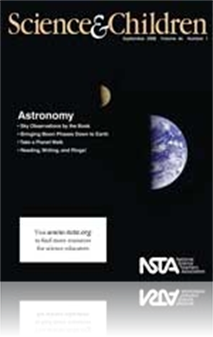All Science and Children resources
Journal Article
Bringing Moon Phases Down to Earth
Teaching astronomy concepts to elementary students does not have to be complicated or require expensive materials. As a teacher resource agent for the American Astronomical Society and through involvement with other science- or astronomy-related orga...
Journal Article
Science Shorts: Here Comes the Sun
Time is an abstract concept for many elementary students. Add to that the idea that the position of the objects in the sky—Sun, Moon, etc.—changes over the course of the day, and you have a mix ripe for confusion and potential misconceptions. In ...
Journal Article
Science 101: How do we know the universe is expanding, and what exactly does that mean?
Unless you’ve been hiding out in a cave for the last 20 years, you’ve heard that the universe is expanding and it started with a big bang. To put an expanding universe in perspective, it helps to imagine that you live in a two-dimensional univers...
Journal Article
Ask five-year-olds what they want to be when they grow up and we may hear “astronaut,” “dinosaur paleontologist,” or even “princess.” Rather than repeat all of the more realistic professions surrounding them, they go with jobs that captur...



